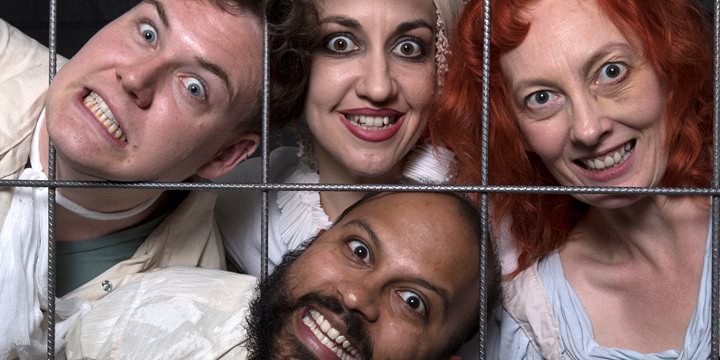It would seem almost perverse to talk about Peter Weiss’The Persecution And Assassination Of Jean-Paul Marat As Performed By The Inmates Of The Asylum Of Charenton Under The Direction Of The Marquis de Sade(or simplyMarat/Sadeif you don’t feel like casually dropping that weighty title about the place) without the conversation taking a dark turn.
After all, the play is famously bleak: it’s a blood-splattered work set in an insane asylum, one that features the godfather of filth himself, the Marquis de Sade, as a central character. Not exactly the stuff you’ll find yourself chatting vague pleasantries about then.
So, no, it’s not surprising that when Barry French, the director behind New Theatre’s upcoming production of the play, is asked about what drew him to the text, the conversation quickly references an extreme right-wing regime. “I remember seeing the play first when I was a student at drama school, back in the ’80s in South Africa,” French says. “It was done at a theatre called the Market Theatre, and it blew me away. There’s something about this show that is compelling. I don’t know what it is.
“Although perhaps it was that for me, growing up under Apartheid South Africa, the show was talking about the rights of the individual. We had very much of a sense of that at the time. And so what I’m trying to do with the production now is trying to find what that relevance is for younger people today. Can this show get a younger audience? I think it can.”
Marat/Sade directly references the work of both Bertolt Brecht and Antonin Artaud, two pioneering playwrights. Brecht was a deconstructionist, determined to openly display theatrical techniques in a post-modern, bare bones style that has influenced everyone from Jean-Luc Godard to True Detective’s Nic Pizzolatto. Artaud, by contrast, strongly believed in the purging aspect of live performance, and developed the about-as-terrifying-as-it-sounds concept of the theatre of cruelty.
For French, these points of reference proved to be something he had to keep very much in mind while staging his new production. “I did quite a bit of thinking about this show before getting to the casting and the directing,” he says. “Back in the ’80s, when we were studying Marat/Sade, the theatre of cruelty and the whole Brechtian thing was all very strong. But that was all before TV really kicked in. That was before CGI.
“At the time we went and watched the first Superman and saw Superman fly and it was like, ‘Wow!’ But now that’s commonplace. So in a world where the most spectacular and amazing things happen in front of your eyes, what makes theatre relevant?”
As far as French is concerned, the pulling power of the play lies, perhaps understandably given its subject matter, in horror. “What is the theatre of cruelty today?” he muses. “I think it’s the stuff we’re doing in Manus Island and Nauru. That is our modern theatre of cruelty. It’s something people regularly identify with.
“The play is set in a mental institution where the people are mentally disturbed,” he continues. “It was set during the French Revolution, and we’re never told how the people were disturbed. But it’s quite possible people retreated into insanity as a ‘healthy response’ to the incredible atrocity they lived through. It’s a rational response. It’s possibly one of the only ways they could protect themselves. And we’re seeing this ourselves on our doorstep. So for me the whole production started from a question of, ‘What if this production is being set not in an asylum but an asylum centre?’”
This sense of a rational response to an irrational stimulus is reflected in the text itself: despite the horror that it touches on, there’s a prevailing sense of eerie, stately calm about the work. It features both musical elements (no, seriously) and rigid, high prose, creating an uneasy tension between medium and message.
Of course, there’s another central tension that dominates the piece too – that being the clash of personalities between de Sade and Jean-Paul Marat, two characters who represent very different aspects of the human condition. “At the centre of the play you have the man who seeks within himself the darkness,” says French. “That’s de Sade. The real life de Sade did put on these pornographic plays – these disgusting seuxal plays. In a modern context he would probably be a pornographer or something. So you have that played against the figure of Marat, who is so obsessed with ideas, the ideas that society can be so much more.”
Ultimately, the work is a shocking, intoxicating look at a society in flux – one that, given the post-Trump candidacy world we now find ourselves firmly mired in the centre of, will be particularly relevant.
“In the Middle East we are looking at societies who are in the midst of change and revolutions,” says French. “We see it in Tunisia, for example, and Egypt … and of course most pertinently in Syria, which has become a hotbed for Daesh. And ordinary people in those situations are coming here, and we are torturing them by taking away hope. So what I’ve tried to do with this production – we’ll see if it works or not, I genuinely don’t know – is I’ve tried to apply to the play that specific filter. We’ll see if it works.”
Marat/Sade runs Wednesday October 5 – Saturday November 5 at the New Theatre.


































